Table of Contents
Anthropology is one of the best optional subjects mentioned in the UPSC Main Examination, covering topics such as human evolution, social structures, cultural evolution, and development. This article will cover the anthropology syllabus, preparation tips, and recommended books shared by ex-toppers to help you study the subject in a very easy manner. The UPSC Anthropology syllabus has two papers.
- Paper I includes topics like social structure, religion, and economic systems, along with the methods used to study them.
- Paper II focuses on Indian society and tribes, exploring their diversity, challenges, and government development programs.
Anthropology Syllabus for UPSC 2025
Choosing Anthropology as an optional subject for UPSC Mains is a good option for candidates with strong skills and an interest in this subject. The Anthropology exam consists of two papers, each of 250 marks, totaling 500 marks. Each paper has two sections with 8 questions, and candidates must answer five, including one compulsory question from the last three.
| Aspect | Details |
| Exam Type | Civil Service Examination |
| Mode | Offline |
| Total Duration | 3 Hours |
| Total Papers | 2 Papers |
| Marks per Paper | 250 Marks |
| Total Marks | 500 Marks |
| Impact on Overall Score |
A strong performance in Anthropology can significantly boost the overall score in the UPSC Mains exam
|
Anthropology Syllabus 2025 for UPSC for Mains Exam
The syllabus for Anthropology is released annually by the UPSC Commission along with the UPSC Notification Below we shared a detailed overview of the UPSC Anthropology Syllabus 2025.
Anthropology Syllabus for UPSC 2025 for Paper 1
The UPSC Syllabus 2025 for Anthropology optional subject Paper 1 is divided into 12 parts, each covering specific topics. Paper 1 is of 250 marks where 5 questions are to be attempted out of the 8 questions, the Anthropology syllabus for UPSC encompasses the following areas:
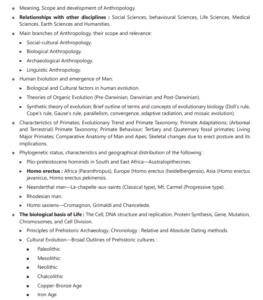
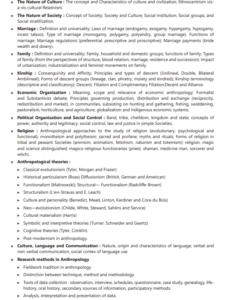
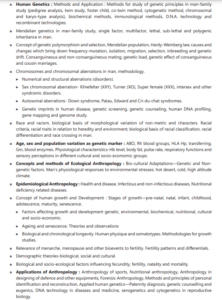
| Anthropology Syllabus for Paper 1 | |
| Topic | Details |
| 1) Meaning, Scope, and Development of Anthropology | Study of human beings and their societies from a holistic perspective. |
| 1.1) Relationships with Other Disciplines | Interdisciplinary connections with Social Sciences, behavioural Sciences, Life Sciences, Medical Sciences, Earth Sciences and Humanities. |
| 1.2) Main Branches of Anthropology and Their Scope and relevance |
|
| 1.3) Human Evolution and the Emergence of Man |
|
| 1.4) The Biological Basis of Life | Examination of genetics, human growth and development, and the biological aspects of human life.
The Cell, DNA structure and replication, Protein Synthesis, Gene, Mutation, |
| 1.5) Principles of Prehistoric Archaeology | Study of archaeological investigation, principles, and chronology of prehistoric cultures. |
| 1.6) Cultural Evolution | Analysis of cultural changes and transformations across time and societies.
|
| 2) Nature of Culture, Society, Marriage, Family, and Kinship | Exploration of culture, society, marriage, family, kinship, and their variations in different cultures. |
| 3) Economic Organization | Meaning, scope and relevance of economic anthropology; Formalist and Substantivist debate; Principles governing production, distribution and exchange (reciprocity, redistribution and market), in communities, subsisting on hunting and gathering, fi shing, swiddening, pastoralism, horticulture, and agriculture; globalization and indigenous economic systems |
| 4) Political Organization and Social Control | Analysis of political systems, governance structures, power relations, and mechanisms of social control.
Band, tribe, chiefdom, kingdom and state; concepts of |
| 5) Religion | Examination of religious beliefs, practices, rituals, and their cultural significance. |
| 6) Anthropological Theories | Study of various theoretical perspectives used in anthropology,
Classical evolutionism (Tylor, Morgan and Frazer) |
| 7) Culture, Language, and Communication | Exploration of the relationship between culture, language, and patterns of communication.
Nature, origin and characteristics of language; verbal and |
| 8) Research Methods in Anthropology | Utilization of methods such as
Fieldwork tradition in anthropology |
| 9) Human Genetics | Study of genetics and its application.
Methods and Application : Methods for study of genetic principles in man-family |
| 10) Concept of Human Growth and Development | Examination of the processes and factors influencing human growth and development. |
| 11) Relevance of Menarche, Menopause, and Other Bioevents | Study of the implications of menarche, menopause, and biological milestones for fertility patterns and differentials. |
| 12) Applications of Anthropology | Anthropology of sports, Nutritional anthropology, Anthropology in designing of defence and other equipments, Forensic Anthropology, Methods and principles of personal identifi cation and reconstruction, Applied human genetics—Paternity diagnosis, genetic counselling and eugenics, DNA technology in diseases and medicine, serogenetics and cytogenetics in reproductive biology |
UPSC Anthropology Syllabus 2025 for Paper 2
The UPSC Anthropology Optional Syllabus for Paper 2 also becomes important as it also follows the same pattern as Paper 1 i.e. it is also of 250 marks. It consists of 9 units, which are as follows:
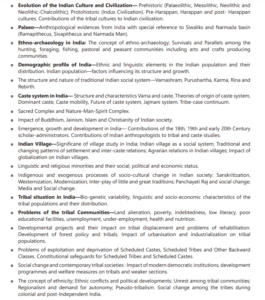

| UPSC Anthropology Syllabus 2025 for Paper 2 | |
| Evolution of the Indian Culture and Civilization |
|
| Palaeo | Anthropological evidence from India with special reference to Siwaliks and Narmada basin (Ramapithecus, Sivapithecus, and Narmada Man). |
| Ethno-archaeology in India |
|
| Demographic Profile of India |
|
| The structure and nature of the traditional Indian social system |
|
| Caste system in India |
|
| Sacred Complex and Nature |
|
|
Emergence and growth of anthropology in India-Contributions of the 18th, 19th, and early 20th Century scholar-administrators. Contributions of Indian anthropologists to tribal and caste studies. |
|
| Indian Village: |
|
| Linguistic and religious minorities and their social, political, and economic status. | |
| Indigenous and exogenous processes of socio-cultural change in Indian society: Sanskritization, Westernization, Modernization; |
|
| The Tribal situation in India | Bio-genetic variability, linguistic and socio-economic characteristics of tribal populations and their distribution. |
| Problems of the tribal Communities | land alienation, poverty, indebtedness, low literacy, poor educational facilities, unemployment, underemployment, health, and nutrition. |
| Developmental Projects and their impact on tribal displacement |
|
| Problems of Exploitation and Deprivation of Scheduled Castes, Scheduled Tribes, and Other Backward Classes. | Constitutional safeguards for Scheduled Tribes and Scheduled Castes. |
| Social Change and contemporary tribal societies | Impact of modern democratic institutions, development programs, and welfare measures on tribals and weaker sections. |
|
The concept of ethnicity |
|
| Impact of Hinduism, Buddhism, Christianity, Islam, and other religions on tribal societies. | |
| Tribe and nation-state – a comparative study of tribal communities in India and other countries. | |
| History of administration of tribal areas, tribal policies, plans, programs of tribal development, and their implementation. | The concept of PTGs (Primitive Tribal Groups), their distribution, and special programs for their development. Role of N.G.O.s in tribal development. |
| Role of anthropology in tribal and rural development. | |
| Contributions of anthropology to the understanding of regionalism, communalism, and ethnic and political movements. | |
Anthropology Syllabus for UPSC PDF
The Anthropology UPSC Syllabus PDF offers a detailed outline of the Anthropology optional subjects for the UPSC examination. It provides a thorough overview of the topics and sub-topics, helping candidates plan their preparation effectively. By consulting the UPSC Anthropology Syllabus PDF, aspirants can gain a clear understanding of the subject’s scope and focus their efforts on specific areas. You can find the link to the Anthropology UPSC Syllabus PDF below.
UPSC Anthropology Syllabus PDF Download
UPSC Anthropology Syllabus Preparation Tips
Candidates can check some of the preparation resources added like using books and newspapers. You can use online resources through different web portals and platforms. Solve UPSC’s previous year’s questions to build a strong understanding of these topics.
- Read NCERT Books
- Analyze Previous Years’ Papers
- Create a Study Plan
- Current Affairs
- Focus on Key Concepts
- Practice Answer Writing
Anthropology Books for UPSC Optional Papers
| Anthropology Books for UPSC Optional Paper 1 | |
| Books | Author/Publisher |
| Introducing Sociology NCERT Class XI | NCERT |
| Biology NCERT Class Xll (Chapters 5, 6, 7) | NCERT |
| An Introduction to Social Anthropology | D.N. Majumdar and T.N. Madan |
| Physical Anthropology | P. Nath |
| An Introduction to Social-Cultural Anthropology | N.K Vaid |
| Anthropological Theories | Makhan Jha |
| Anthropology Books for UPSC Optional Paper 2 | |
| Books | Author/Publisher |
| Indian Anthropology | Nadeem Hasnain |
| Anthropology Simplified | Vivek Bhasme |
| Indian Society NCERT Class XII | NCERT |
| The Tribal Culture of India | LP Vidyarthi |
| Tribal India | Nadeem Hasnain |
| History of Anthropology Thought | Gaya Pandey & Vijay S Upadhyay |
| Xaxa Tribal Committee Report | XaXa Committee |
| Related Articles | |
| UPSC History Syllabus | |
| UPSC Zoology Syllabus | |
| UPSC Polity Syllabus | |
| UPSC Public Administration Syllabus | |

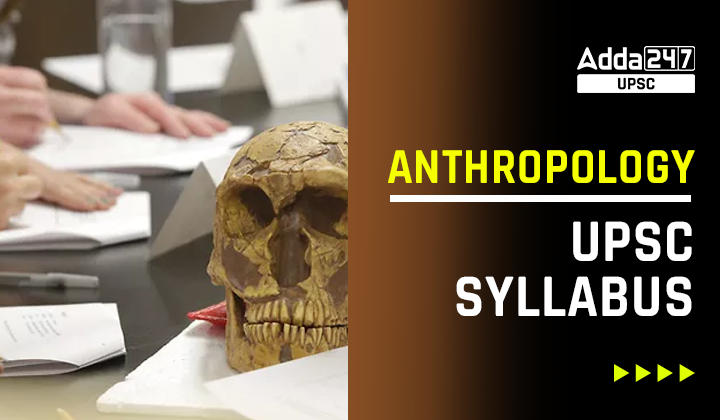

 APSC Syllabus 2025, Download Prelims And...
APSC Syllabus 2025, Download Prelims And...
 Punjab PCS Syllabus 2025, New Prelims an...
Punjab PCS Syllabus 2025, New Prelims an...
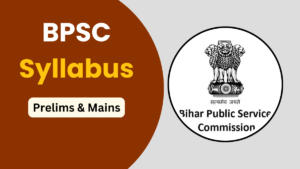 BPSC Syllabus 2025 and Exam Pattern For ...
BPSC Syllabus 2025 and Exam Pattern For ...




